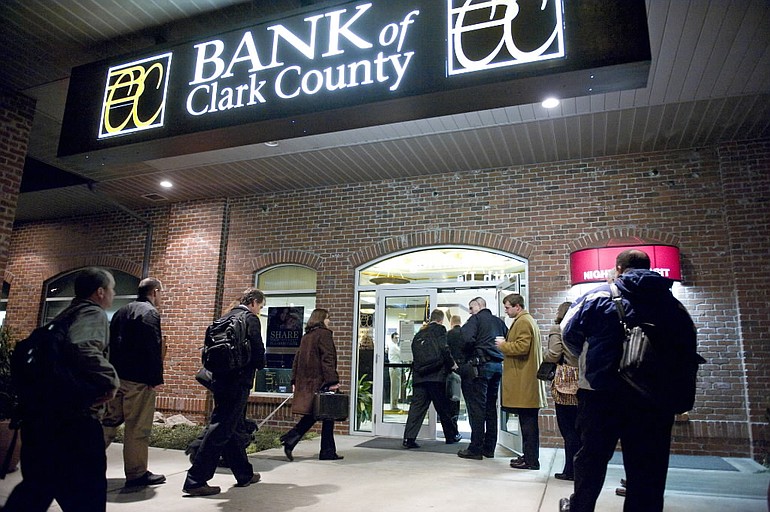Washington bank regulators are backing revisions to state law that would block the public’s access to state information on troubled banks.
Four proposed bills have been drafted by the Washington Department of Financial Institutions in response to a rash of bank closures last year. The bills mostly aim to clarify to bank managers the actions DFI will take when it steps in to help fix or close state-chartered banks and credit unions, said DFI Director Scott Jarvis.
But House Bills 2830 and 2831 and Senate Bills 6369 and 6370 also contain a few lines revising public disclosure laws. The rule changes, submitted to the Legislature in January after clearing Gov. Chris Gregoire’s office, ensure those regulatory actions and related information are never made public, unless DFI’s director decides otherwise.
“I’m disturbed that these bills give DFI a lot more power … to seize banks and displace their officials and at the same time, greater authority to keep this from the public,” said Toby Nixon, president of the Washington Coalition for Open Government in Seattle. “It should be the opposite. There needs to be more transparency.”
Should the Legislature pass bills that modify public disclosure laws to block public access to enforcement actions taken by the Washington state Department of Financial Institutions against state-chartered banks and credit unions?
? On one side: DFI says the bills will protect taxpayers and troubled banks by preventing the release of information that leads to a run on a bank's funds.
? On another side: Open-government advocates say the bills would prevent public oversight of DFI's banking regulations and authority and would keep consumers in the dark about their bank's finances.
? How to get involved: 49th District legislators are available at www.leg.wa.gov or add your comments to the story online at www.columbian.com.
The bills were drafted, in part, due to lessons from DFI’s closure of the Bank of Clark County in Vancouver in January 2009, Jarvis said. Information about the bank’s possible closure circulated for weeks beforehand, he said, triggering a run on the bank’s funds and nearly causing it to fail midweek, instead of on the prescribed Friday.
Should the Legislature pass bills that modify public disclosure laws to block public access to enforcement actions taken by the Washington state Department of Financial Institutions against state-chartered banks and credit unions?
? On one side: DFI says the bills will protect taxpayers and troubled banks by preventing the release of information that leads to a run on a bank’s funds.
? On another side: Open-government advocates say the bills would prevent public oversight of DFI’s banking regulations and authority and would keep consumers in the dark about their bank’s finances.
? How to get involved: 49th District legislators are available at www.leg.wa.gov or add your comments to the story online at www.columbian.com.
DFI says restricting public information about its regulatory actions will prevent misunderstandings that cause depositors to withdraw their money and further jeopardize the bank, causing it to fail.
“Releasing certain information would be damaging to the taxpayers ultimately if it harms the bank,” said Jarvis, “and it wouldn’t allow us to counsel the bank through difficult times.” The bills also aim to stem leaks from inside bank management by imposing new, $10,000 fines to bank and credit union employees for unlawful disclosure.
Public’s right to know
But open government proponents in the state argue that employees or others familiar with the actions will leak information no matter what the state law is. Such internal leaks took place at Bank of Clark County, insiders say.
The lack of any official information from DFI about a troubled bank will only fuel rumors and speculation, Nixon said.
“We haven’t heard a great reason for why the department needs the ability to keep these final enforcement orders effectively secret forever, if they choose to,” he said.
As a compromise, the coalition proposes a narrower exemption that opens DFI records to the public after a bank is closed.
But after six bank closures in Washington over the past year, public trust of the state’s financial institutions has greatly eroded. Bank customers are hungry for more information about the safety of their deposits and have little trust that their banks will tell them the truth.
“Is there no way we can vet banks?” said Florence Wager, a former Bank of Clark County customer who lost $161,000 in uninsured deposits when the bank closed. “For us not to have information as a layperson and as a consumer is absolutely incredible. Oh sure, let’s give them another smokescreen.”
Filing requests
Under current state public records law, reports related to DFI’s regular financial examinations of state-chartered banks and credit unions are kept confidential. But the public can file requests for copies of DFI’s regulatory actions, including supervisory agreements, directions, consent orders and final orders.
The Federal Deposit Insurance Corp. also releases information about state regulatory actions that the federal regulator participates in, including cease-and-desist orders.
The proposed legislation wouldn’t affect releases from the FDIC, but it would allow DFI to withhold all of DFI’s actions from the public. As a result, the only public information available on the financial situations of state-chartered banks would be their quarterly call reports — a ledger of numbers that’s difficult to parse to anyone but a banker.
“It deprives the public of the ability to monitor and understand what the DFI is doing,” said Eric Stahl, an attorney with Davis Wright Tremaine in Seattle who consults for The Columbian.
“It’s directly contrary to the premise of the whole public records regime in Washington,” Stahl said. “Agencies don’t get to determine which of their actions the public gets to know about.”
The bills have passed out of policy committees in the House and Senate and are subject to modification before they head to a floor vote.



